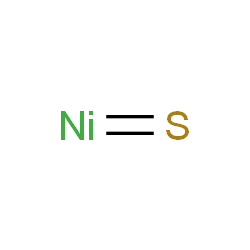16812-54-7
| 中文名 | 硫化镍(II) |
|---|---|
| 英文名 | Nickel(II) Sulfide |
| 英文别名 |
EINECS 240-841-2
MFCD00016266 nickel sulfide Thioxonickel |
| 密度 | 5.3 g/cm3 |
|---|---|
| 熔点 | 797ºC |
| 分子式 | NiS |
| 分子量 | 90.758 |
| 精确质量 | 89.907417 |
| PSA | 25.30000 |
| 外观性状 | Powder |
| 蒸汽压 | 12600mmHg at 25°C |
| 储存条件 | 常温密闭避光,通风干燥 |
| 稳定性 | 常温常压下稳定 避免的物料: 氧化物 酸. 相对密度5.3~5.65(α);5.0~5.6(β);5.34(γ,30℃)。熔点797℃(α);810℃(β);γ-NiS在396℃时转变为βNiS。α-NiS溶于盐酸,在空气中转变成Ni(OH)S。β-NiS在2mol/L HCl中煮沸,迅速溶解。它们均溶于硝酸和王水。 |
| 水溶解性 | 0.00036g/100mL H2O (18°C) [CRC10] |
| 计算化学 | 1.疏水参数计算参考值(XlogP):无 2.氢键供体数量:0 3.氢键受体数量:1 4.可旋转化学键数量:0 5.互变异构体数量:无 6.拓扑分子极性表面积32.1 7.重原子数量:2 8.表面电荷:0 9.复杂度:2 10.同位素原子数量:0 11.确定原子立构中心数量:0 12.不确定原子立构中心数量:0 13.确定化学键立构中心数量:0 14.不确定化学键立构中心数量:0 15.共价键单元数量:1 |
| 更多 | 1.性状:黑色粉末。 2.密度(g/mL,25/4℃):5,3 -5.6 3.相对蒸汽密度(g/mL,空气=1):未确定 4.熔点(ºC):797°C 5.沸点(ºC,常压):未确定6.沸点(ºC,5.2kPa):未确定 7.折射率:未确定 8.闪点(ºC):未确定 9.比旋光度(º):未确定 10.自燃点或引燃温度(ºC):未确定 11.蒸气压(kPa,25ºC):未确定 12.饱和蒸气压(kPa,60ºC):未确定 13.燃烧热(KJ/mol):未确定 14.临界温度(ºC):未确定 15.临界压力(KPa):未确定 16.油水(辛醇/水)分配系数的对数值:未确定 17.爆炸上限(%,V/V):未确定 18.爆炸下限(%,V/V):未确定 19.溶解性:未确定 |
|
Section 1: Product Identification Chemical Name:Nickel (II) sulfide (99.9%-Ni) CAS Registry Number:16812-54-7 Formula:Ni3S2/NiS EINECS Number:240-841-2 Chemical Family:metal chalcogenides Synonym:Nickel monosulfide
Section 2: Composition and Information on Ingredients IngredientCAS NumberPercentACGIH (TWA)OSHA (PEL) Title Compound16812-54-7100%0.2mg/m31mg/m3 Section 3: Hazards Identification Irritating to skin, eyes and respiratory tract. May cause sensitization by skin contact. May cause cancer by Emergency Overview: inhalation. Primary Routes of Exposure:Ingestion, inhalation, skin and eyes Eye Contact:Dust causes moderate irritation of the eyes. Skin Contact:Causes slight irritation of the skin. Prolonged contact with nickel salts may lead to dermatitis. Inhalation:Inhalation of dust will lead to irritation of the respiratory tract. May cause cancer by inhalation. Gastric juices may cause release of toxic hydrogen sulfide, causing, nausea, dizziness, pulmonary edema, Ingestion: death. Acute Health Affects:Irritating to skin, eyes and respiratory tract. May cause sensitization by skin contact. Long term exposure to nickel and nickel compounds may lead to skin irritation and dermatitis. May cause Chronic Health Affects: cancer. NTP:Yes IARC:Yes OSHA:No SECTION 4: First Aid Measures Immediately flush the eyes with copious amounts of water for at least 10-15 minutes. A victim may need Eye Exposure: assistance in keeping their eye lids open. Get immediate medical attention. Wash the affected area with water. Remove contaminated clothes if necessary. Seek medical assistance if Skin Exposure: irritation persists. Remove the victim to fresh air. Closely monitor the victim for signs of respiratory problems, such as difficulty Inhalation: in breathing, coughing, wheezing, or pain. In such cases seek immediate medical assistance. Seek medical attention immediately. Keep the victim calm. Give the victim water (only if conscious). Induce Ingestion: vomiting only if directed by medical personnel. SECTION 5: Fire Fighting Measures Flash Point:not applicable Autoignition Temperature:no data Explosion Limits:no data Extinguishing Medium:carbon dioxide or dry powder If this product is involved in a fire, fire fighters should be equipped with a NIOSH approved positive pressure Special Fire Fighting Procedures: self- contained breathing apparatus and full protective clothing. Hazardous Combustion andIf involved in a fire this material may emit irritating fumes of hydrogen sulfide and sulfur dioxide. Decomposion Products: Dust may form explosive mixtures with air. Contact with acids gives off hydrogen sulfide, a toxic and Unusual Fire or Explosion Hazards: flammable gas. SECTION 6: Accidental Release Measures In the case of a spill, the fine powder should be covered with dry sodium carbonate or dolomite in order to Spill and Leak Procedures: reduce the formation of dust. Sweep up the mixture. SECTION 7: Handling and Storage Store in a tightly sealed container. Exposure to the atmosphere may lead to release of toxic hydrogen sulfide Handling and Storage: gas. Empty containers may retain product residues that evolve toxic gases. SECTION 8: Exposure Controls and Personal Protection Eye Protection:Always wear approved safety glasses when handling a chemical substance in the laboratory. Skin Protection:Wear appropriate chemical resistant gloves and protective clothing. Ventilation:If possible, handle the material in an efficient fume hood. If ventilation is not available a respirator should be worn. The use of a respirators requires a Respirator Respirator: Protection Program to be in compliance with 29 CFR 1910.134. Ventilation:If possible, handle the material in an efficient fume hood. Additional Protection:No additional protection required. SECTION 9: Physical and Chemical Properties Color and Form:-200 mesh black pwdr. Molecular Weight:not applicable Melting Point:797° Boiling Point:no data Vapor Pressure:not applicable Specific Gravity:5.3-5.65 Odor:none Solubility in Water:insoluble SECTION 10: Stability and Reactivity Stability:air and moisture stable Hazardous Polymerization:no hazardous polymerization Conditions to Avoid:Contact of dust cloud with an ignition source. Incompatibility:none Decomposition Products:hydrogen sulfide, sulfur dioxide, and metal oxides. SECTION 11: Toxicological Information RTECS Data:No specific information available on this product. Carcinogenic Effects:Tumorigen Mutagenic Effects:no data Tetratogenic Effects:no data SECTION 12: Ecological Information Ecological Information:No information available SECTION 13: Disposal Considerations Disposal:Dispose of according to local, state and federal regulations. SECTION 14: Transportation Shipping Name (CFR):Non-hazardous Hazard Class (CFR):NA Additional Hazard Class (CFR):NA Packaging Group (CFR):NA UN ID Number (CFR):NA Shipping Name (IATA):Non-hazardous Hazard Class (IATA):NA Additional Hazard Class (IATA):NA Packaging Group (IATA):NA UN ID Number (IATA):NA SECTION 15: Regulatory Information TSCA:Listed in the TSCA inventory. SARA (Title 313):Title compound: see category code N495 for reporting. Second Ingredient:none SECTION 16 - ADDITIONAL INFORMATION N/A |
|
生态学数据: 对水体是危害的,即使小量产品不能接触地下水,水道或污水系统,未经政府许可勿将材料排入周围环境。 CHEMICAL IDENTIFICATION
|
| 危害码 (欧洲) | T,N |
|---|---|
| 风险声明 (欧洲) | 43-49-50/53 |
| 安全声明 (欧洲) | 53-45-61 |
| 危险品运输编码 | UN 2811 |



